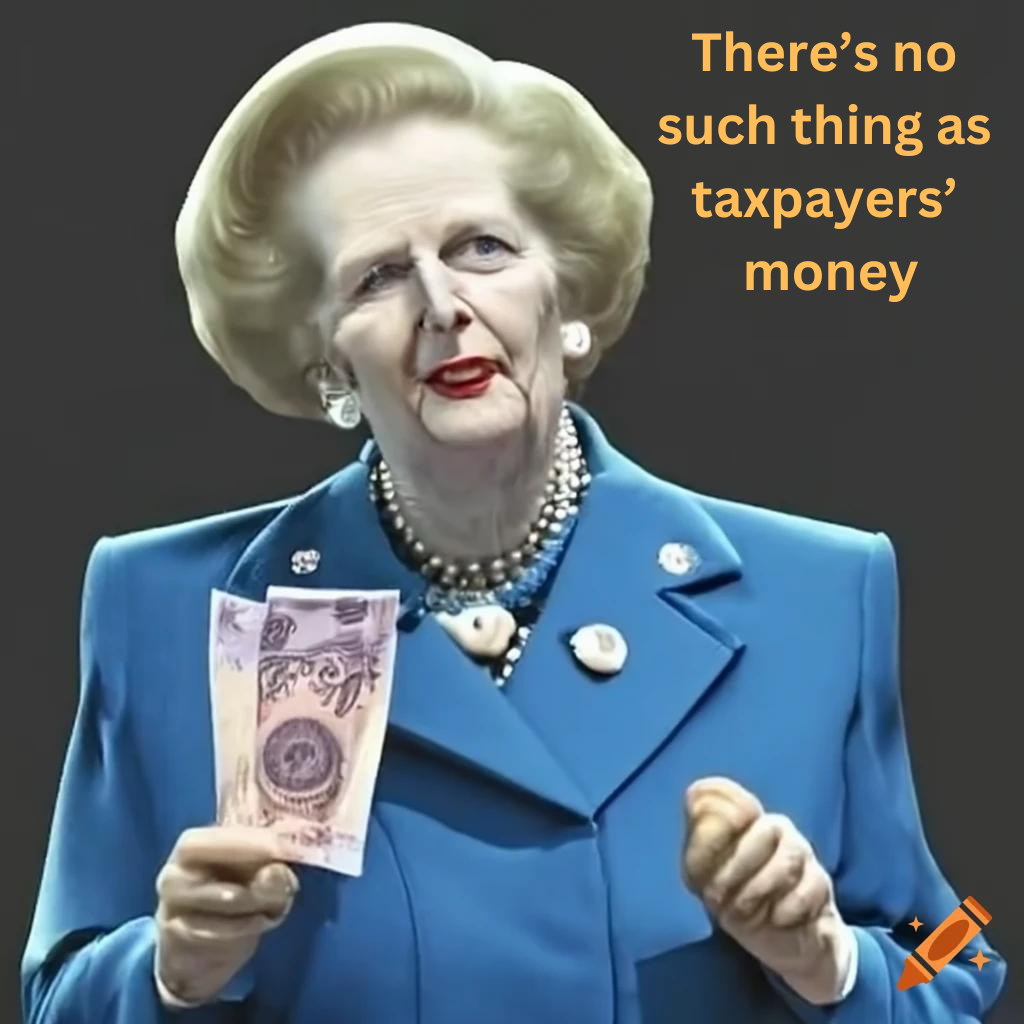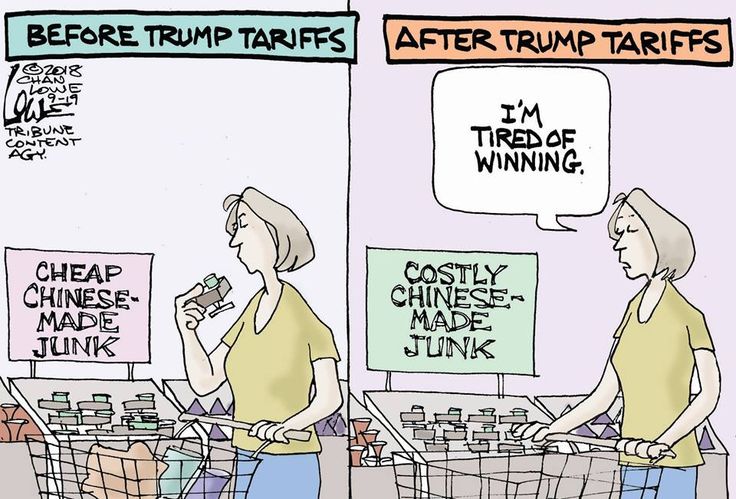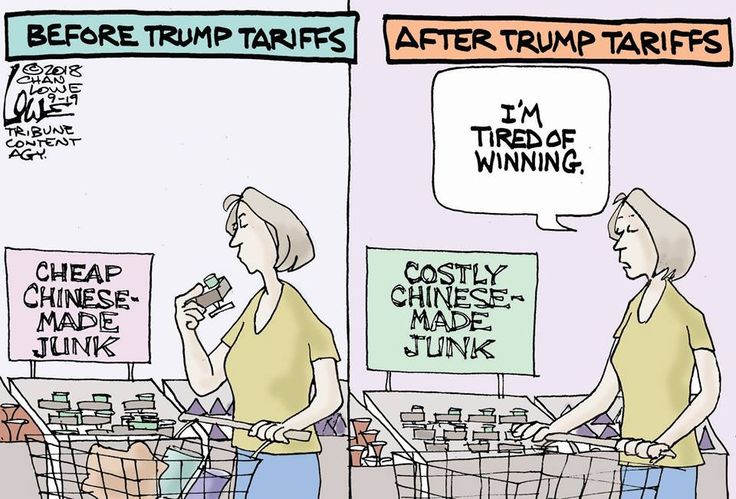Winning
-
Here's my uneducated take, with little to no understanding of what's going on in detail:
US public debt is at extraordinary levels. The treasury is hesitant to issue more debt and Donny doesn't want to start his tenure with raising taxes on poor people (that will come in a few months, under the pretense to raise money for war with China or some shit). Therefore, he needs to collect money, whilst appeasing to right nationalists & business. Enter: Tarrifs.
Destroy my armchair take!
He’s already planned tax “cuts” that only cut taxes for those making north of $500k/yr. They go up for everyone under that. So we got both!
-
At the federal level taxes aren't used to pay debt, they're used to reduce the money supply. That money goes into a shredder, and is functionally unrelated to the money printed.
This seems very odd... Can you give me a source on that? Both the shredding of federal tax income and the relation to public expenditure? It appears I have much to learn
-
Here's my uneducated take, with little to no understanding of what's going on in detail:
US public debt is at extraordinary levels. The treasury is hesitant to issue more debt and Donny doesn't want to start his tenure with raising taxes on poor people (that will come in a few months, under the pretense to raise money for war with China or some shit). Therefore, he needs to collect money, whilst appeasing to right nationalists & business. Enter: Tarrifs.
Destroy my armchair take!
The last time we had a balanced budged was during the Clinton years. Now I was barely out of high school and hardly paid a bit of attention to such matters at the time, but then there was a little event towards the end of 2001 that turned everything upside down. The military and police became supreme concerns and letting The Market
 fix everything was the name of the game under Bush. So much so that we got to experience the 2008 collapse during the Obama years in a major part due to the banks giving loans to people who couldn't pay them on properties that where massively over valued. We've never managed to put things back in order since, in part because the climate got so polarized that 'my team' could NEVER support anything in the least that would be supported by THEM.
fix everything was the name of the game under Bush. So much so that we got to experience the 2008 collapse during the Obama years in a major part due to the banks giving loans to people who couldn't pay them on properties that where massively over valued. We've never managed to put things back in order since, in part because the climate got so polarized that 'my team' could NEVER support anything in the least that would be supported by THEM.Throw in a dash of citizens united completely shifting any sense of public input into politics for anyone not a multi millionaire or more and some populist prattling about the good-ol-days and you get what we have now where a big chunk of people who can't care to think for a moment of the actual policies being proposed beyond which team put it forth and you have a lovely recipe for an open pillaging by those with the power to do so.
Yeah, part of me wants to just shut off the news for the next several years, but unfortunately being prepared requires being aware...
-
The posts you reply to have been deleted, but I'm assuming it's talking about "taking responsibilities about the people's vote" based on this single quote...
From a foreigner perspective it's hard to imagine how a federal election is perceived for Americans, because your country is so big with so many states that have completely different mindset and economics.
In Europe we have a shared parliament that works on making compromises on some topics, but I guess a global referendum would be a huge mess too.
-
This seems very odd... Can you give me a source on that? Both the shredding of federal tax income and the relation to public expenditure? It appears I have much to learn

MMT: Taxes do not fund government spending - Modern Money Theory (MMT)
Modern Monetary Theory explains that a country that issues its own currency (like the UK and USA), can instruct its Central Bank to credit the money into an

Modern Money Theory (MMT) (www.mmt.works)
-
Very far on the outside.
-
We live in interesting times, no doubt about it.
-

MMT: Taxes do not fund government spending - Modern Money Theory (MMT)
Modern Monetary Theory explains that a country that issues its own currency (like the UK and USA), can instruct its Central Bank to credit the money into an

Modern Money Theory (MMT) (www.mmt.works)
Surely, if printing money (theoretically) causes inflation; and if collecting taxes reduces inflation, then the two are somewhat closely related.
If the amount of money that can be created by the government is somewhat limited, then surely tax money is another valid source for that money.
-
This post did not contain any content.
The right time for Chinese tariffs was 1980.
-
This post did not contain any content.
She got thinner
-
The posts you reply to have been deleted, but I'm assuming it's talking about "taking responsibilities about the people's vote" based on this single quote...
From a foreigner perspective it's hard to imagine how a federal election is perceived for Americans, because your country is so big with so many states that have completely different mindset and economics.
In Europe we have a shared parliament that works on making compromises on some topics, but I guess a global referendum would be a huge mess too.
Frankly the whole thing needs an overhaul. Between land having more of a say than people, a structure for congress that hasn't appropriately resized, FPTP voting... Its a mess.
You can easily end up with the tyranny of the minority as a result.
-
This implies that local availability of competitive products exists, which for the vast majority of things in the US is not the case. So many of our goods are made overseas and imported.
Tariffs are going to raise consumer expenses till one of two things happens: Local production ramps up and provides local goods (at likely a similar or higher price because our wages are higher than overseas) or a political change occurs that results in the removal of the tariffs. Either way US consumers are going to feel the increased cost of goods for the foreseeable future...
-
She got thinner
Egg prices
-
Egg prices
The Trump administration is destroying our great nation's thick milfs
-

MMT: Taxes do not fund government spending - Modern Money Theory (MMT)
Modern Monetary Theory explains that a country that issues its own currency (like the UK and USA), can instruct its Central Bank to credit the money into an

Modern Money Theory (MMT) (www.mmt.works)
That makes for an interesting take to things, however it's simply an inverted way to think of paying for a debt incurred. Without the repayment by government revenue you would simply have acquisition by the government without a means to compensate for it.
The materials purchased have a cost. That cost is paid by the money created by the government. If the government simply continues to create an unbound supply of money then the currency becomes worthless and you end up with a hyper inflation cycle. See places like Zimbabwe or Venezuela where at some point you end up paying thousands of the sovereign currency for basic items. That currency volume needs to be maintained at some reasonable level for it to have any meaningful exchange value to another party.
So while it may not be directly input/output as the general population would see it, you could instead see it as a credit card. A limit is available on a card and to use it you must have available credit which is freed up by repayment of previous purchases.
Now, the fed through congress has the unique ability to extend their limit on demand, that still increases the debt load and associated interest payments, which is visible in the form of treasury bonds due and payable with accrued interest to the holder of those bonds. Those bonds are public debt, often held by foreign governments, but also by private sector investors, both which are assured payment by the credit worthiness of the government. This all is why there's such a fuss when talk of the government defaulting their debt comes about, the credit rating of the government, and why we have regular fights over extending that debt ceiling.
-
This post did not contain any content.
“Hahah how true,” the liberal said as they view this on their Chinese made iPhone.
Really revealing American racism for what it is. But please, keep it up. People are noticing, and you’re losing more voters.
-
This implies that local availability of competitive products exists, which for the vast majority of things in the US is not the case. So many of our goods are made overseas and imported.
Tariffs are going to raise consumer expenses till one of two things happens: Local production ramps up and provides local goods (at likely a similar or higher price because our wages are higher than overseas) or a political change occurs that results in the removal of the tariffs. Either way US consumers are going to feel the increased cost of goods for the foreseeable future...
Agreed that the typical, more realistic case is what will happen.
I’ve gotten into arguments with other keyboard warriors over this point, so it’s something I mention when tariffs are discussed.
-
“Hahah how true,” the liberal said as they view this on their Chinese made iPhone.
Really revealing American racism for what it is. But please, keep it up. People are noticing, and you’re losing more voters.
Right, what a load of bullshit.
Chinese stuff is just "junk"?
Do they not realise a huge number of goods are made in China, how ignorant.
-
That makes for an interesting take to things, however it's simply an inverted way to think of paying for a debt incurred. Without the repayment by government revenue you would simply have acquisition by the government without a means to compensate for it.
The materials purchased have a cost. That cost is paid by the money created by the government. If the government simply continues to create an unbound supply of money then the currency becomes worthless and you end up with a hyper inflation cycle. See places like Zimbabwe or Venezuela where at some point you end up paying thousands of the sovereign currency for basic items. That currency volume needs to be maintained at some reasonable level for it to have any meaningful exchange value to another party.
So while it may not be directly input/output as the general population would see it, you could instead see it as a credit card. A limit is available on a card and to use it you must have available credit which is freed up by repayment of previous purchases.
Now, the fed through congress has the unique ability to extend their limit on demand, that still increases the debt load and associated interest payments, which is visible in the form of treasury bonds due and payable with accrued interest to the holder of those bonds. Those bonds are public debt, often held by foreign governments, but also by private sector investors, both which are assured payment by the credit worthiness of the government. This all is why there's such a fuss when talk of the government defaulting their debt comes about, the credit rating of the government, and why we have regular fights over extending that debt ceiling.
Yes, this is all well accounted for in MMT. I recommend reading a bit more on the website I linked or on the wikipedia page about it.
-
The right time for Chinese tariffs was 1980.
Not arguing. But why that year specifically?


